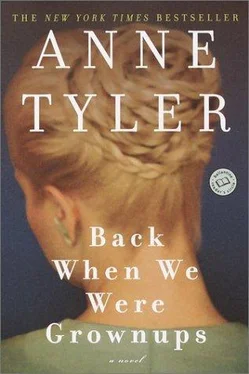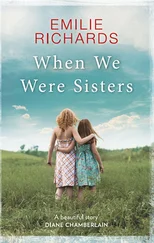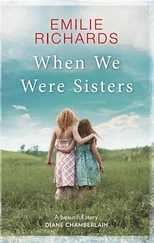He said, “You ought to check out my house. You know my daughter? Felicia?” Then the phone rang again.
Rebecca sighed and reached for the receiver. “Hello,” she said.
Will Allenby said, “Rebecca?”
She said, “Oh.”
“Don’t hang up!”
“I wasn’t going to hang up,” she told him.
Although a part of her would have liked to. It was only curiosity that stopped her.
He said, “I just wanted to apologize for the other evening.”
“That’s quite all right,” she said stiffly.
“I never meant for the conversation to go that way, believe me. I don’t know how it happened.”
The odd thing was, the apology made her feel humiliated all over again. But she said, “Really, don’t give it a thought. I’ve forgotten it completely. Thanks for calling, though.”
“Wait!”
She waited.
“Please,” he said. “Could we just talk a little bit? Could you just listen?”
“Well,” she said, “all right. I guess so.”
“I seem to be in… something of a sorry state, Rebecca. Lately it’s been all I can do just to get up in the morning. I get up; I look in the mirror; I think, Oh, God, it’s the same old, same old me, and I want to crawl back into bed and stay there forever.”
Rebecca held very still, as if he could observe how attentively she was listening.
He said, “The fact of the matter is, the divorce was my wife’s idea, not mine. I’m not even sure what went wrong there! One day she just announced that she wanted me to move out. And of course she kept our daughter with her. I can understand that; what do I know about teenaged girls? But we both agreed that I’d still have lots of contact. I would see my daughter regularly, any day I liked, back and forth between our two places. Now whenever I phone, though, Beatrice is busy. I ask her to come for supper and she says she’s got a friend over, or she’s made other plans. She never has any time to get together.”
“Well, she’s seventeen!” Rebecca said. “Of course she doesn’t have time.”
“I tell her to bring the friend along and she says her friend wouldn’t feel comfortable in my apartment.”
“You know how teenagers are. They’re constitutionally ashamed of their parents. It isn’t personal.”
“No,” Will said, “there’s more to it than that. I can’t explain it. It seems I’m just… destined not to have anyone in my life. Here I am, all alone in this old lady’s dead-quiet house, and it feels so natural; that’s the worst of it. It feels like my natural state. What did you expect? I ask myself. Did you imagine someone would actually want to stay with you forever? You should thank your lucky stars you ever got married at all. It’s as if I’m lacking some talent that everyone else takes for granted.”
“Now, Will, you’re just plain wrong about that,” Rebecca said.
“Okay,” he said. “Then tell me.”
“Tell you what?”
“Tell me why you broke up with me.”
“We’ve been through that! When Joe Davitch came along—”
“No, I want the real reason. I want you to be honest.”
“I am being honest!” she said.
“Don’t insult my intelligence, Rebecca.”
She felt stung. She said, “I can see this is going nowhere; so I’m going to hang up now. Goodbye.”
And without waiting for his answer, she put the receiver back on the hook.
The plumber was packing his tools away more noisily than seemed necessary, with lots of clanks and rattles and many exaggerated grunts as he reached for various wrenches. She suspected he felt embarrassed for her. “What a nuisance!” she said gaily. “These people who stay on the phone forever; I just never know how to get off, do you?”
The plumber said, “Sort of persistent type, was he?”
Then he cocked his head at her and waited, looking expectant, but Rebecca just said, “Right,” and asked if he’d fixed the leak.
She wished she hadn’t ended the call so abruptly. She was beginning to get that awful torn feeling she always had after saying something hurtful to somebody.
For the rest of the afternoon the telephone was silent, but at suppertime, there was the usual flurry of telemarketers. Also another call from the Second Eden man. “Those azaleas I told you we had, they’re a teensy bit off from the color I said. They’re more like a, what would you say, not a pink, not a red, not orange—”
“I couldn’t care less what color they are. Any color. Fine,” she said, and she hung up and returned to the table. “If I could undo one modern invention,” she told Poppy, “I believe it would be the telephone.”
“Why, I would choose the zipper,” he said.
Rebecca stared at him a moment, but before she could pursue the subject, the telephone rang again. Mrs. Allen had forgotten to mention that her husband didn’t eat red meat. Then a moment later, she called back: he didn’t eat chicken, either.
“Why don’t you let that machine of yours pick up?” Poppy asked Rebecca.
A reasonable enough question. She didn’t tell him that she kept thinking each call might be Will Allenby.
The evening seemed to be the time for wrong numbers. Three different people phoned by mistake, one of them several times in succession — a Slavic-sounding woman who wanted to argue the issue. “Wrong number! No! This is not wrong number! I telephone my daughter! Bring her on!”
At nine o’clock, Rebecca went off to bed with one of her Robert E. Lee books. It began with Lee’s genealogy, which she found dull. She made herself continue, though. The thought came to her (on a whole separate track in her brain, while the first track continued cataloguing Lee’s great-grandparents) that over the years, she had gradually given up reading anything difficult. Even a newspaper article, the briefest little piece: if the first line didn’t grab her, she turned the page. It was something like her attitude toward exercise. Whenever she grew the least bit tired or out of breath, she quit. “I figure my body’s trying to tell me something,” she would say jokingly to Patch. (For invariably, it was Patch who urged her into these fitness efforts.) “If it’s sending me such a clear message, how can I ignore it?”
When Lee’s great-grandparents gave way to his grandparents, she put down her book and phoned Zeb. “What are you doing?” she asked when he answered.
“I’m reading about the harmful effects of night-lights.”
“Night-lights!”
“Evidently, children who’ve been raised with night-lights in their rooms end up having vision problems. Their eyes don’t get enough rest, is the hypothesis.”
“Or maybe,” Rebecca said, “the children didn’t see well to begin with, and there’s some biological connection between fear of the dark and bad eyesight; ever thought of that?”
“Hmm.”
“Maybe their bad eyesight caused their fear of the dark. The chair that looks like a monster, for instance.”
“This subject appears to have really gripped your imagination,” Zeb told her.
“Yes, well…”
She glanced at her clock radio. It was almost 10 p.m. Anybody phoning this late would think, Who can she be talking to?
She must be so popular! he would think.
“I’ve been making some resolutions,” she told Zeb. “From now on, I’m reading two books a week, serious books that I have to work at. Also, I’m joining a gym. I plan to get into shape, for once.”
“Now, what would you want to do that for? You’re fine the way you are.”
“No, I’m not! I’m a slug. You of all people, a doctor… Or maybe I should take up jogging. That would be less expensive. Except jogging’s affected by weather. Half the time the weather would be too hot, or it would be raining. I would feel so conspicuous, jogging with an umbrella.”
Читать дальше












